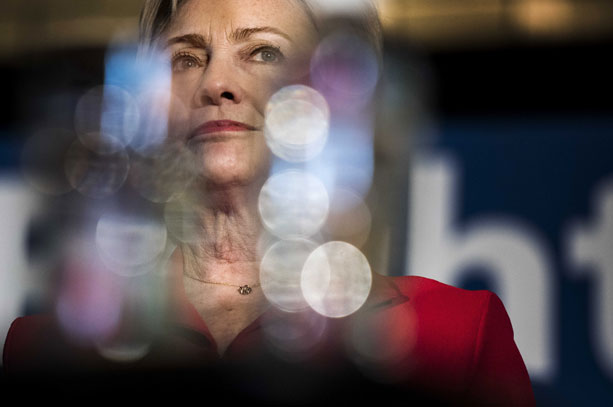
En route to fight one of his many duels, French politician Georges Clemenceau bought a one-way train ticket. Was he pessimistic? "Not at all. I always use my opponent's return ticket for the trip back." Some Hillary Clinton advisers, although not that serene, think her victory is probable and can be assured.
Her challenge is analogous to Ronald Reagan's in 1980, when voters were even more intensely dissatisfied than they now are. There were hostages in Iran and stagflation's "misery index" (the sum of the inflation and unemployment rates) was 21.98.
By August 1979, 84 percent of Americans said the country was on the wrong track. A substantial majority did not want to re-elect Jimmy Carter but a majority might do so unless convinced that Reagan would be a safe choice. Reagan's campaign responded by buying time for several half-hour televised speeches and other ads stressing his humdrum competence.
Now, voters reluctant to support the unpleasant and unprepared Republican also flinch from Clinton, partly because of the intimacy the modern presidency forces upon them: As one Clinton adviser uneasily notes, a president spends more time in the average family's living room than anyone who is not a family member. Clinton is not a congenial guest.
Her opponent radiates anger, and America has not elected an angry president since Andrew Jackson, long before television brought presidents into everyone's living room, where anger is discomfiting. Clinton's campaign must find ways to present her as more likable than she seems and more likable than her adversary, both of which are low thresholds. Regarding the threshold that matters most — 270 electoral votes — she would not trade places with her opponent.
Since 1976, Florida, today's largest swing state, has been somewhat more Republican than the nation. Clinton now is in a statistical tie there (in the Real Clear Politics average of polls), where the Hispanic vote is growing and moving left. She leads in Virginia, the third-largest swing state (behind Ohio), by RCP's 5.3 points and in another purple state, Colorado, by 8 points.
One state that might indicate a tectonic shift in American politics is Arizona, which has voted for a Democratic presidential candidate only once since Harry Truman in 1948 (Bill Clinton in 1996, by 2.2 points). In 2012, Mitt Romney defeated Barack Obama there by 9 points.
Today, however, John McCain's sixth Senate campaign may be becoming his most difficult. His trademark has been "straight talk" but now he must mumble evasions about the man at the top of the Republican ticket who has disparaged McCain's war service. McCain, who has won his five previous elections by an average of 33.4 points, today leads in the RCP average by 5.5.
If Clinton, who is in another statistical tie in Arizona, decides to compete there, one reason will be the Mormons. They are just 5 percent of the state population, but 8 percent of the general election turnout.
In a competitive election, their deep cultural antipathy toward Donald Trump might swing 11 electoral votes. Utah Republicans in this year's caucuses voted 69.2 percent for Ted Cruz, 16.8 for John Kasich and 14 percent for Trump. If Arizona becomes a presidential battleground this year, it will validate The Atlantic's Ron Brownstein's analysis that any Trump gains for the GOP among white blue-collar votes in Rust Belt states (e.g., Ohio, Wisconsin, Pennsylvania, Michigan) may be more than matched by Clinton gains among minorities and persons with college educations in Sunbelt states and elsewhere.
Clinton's selection of Virginia's U.S. Sen. and former Gov. Tim Kaine represents the rare intersection of good politics and good governance. He increases her chance of winning the 13 electoral votes of his state, which has voted with the presidential winner in four consecutive elections and seven of the last nine. He, like she, has been an executive, so perhaps experience has inoculated him against the senatorial confusion between gestures and governing.
There probably is no Democratic governor or senator more palatable than Kaine to constitutional conservatives. Such conservatives are eager to bring presidential power back within constitutional constraints, and Kaine is among the distressingly small minority of national legislators interested in increased congressional involvement in authorizing the use of military force. And as a member of both the Armed Services and Foreign Relations committees, Kaine can, if their paths ever cross on the campaign trail, patiently try to help Trump decipher the acronym NATO.
Comment by clicking here.



 Contact The Editor
Contact The Editor
 Articles By This Author
Articles By This Author